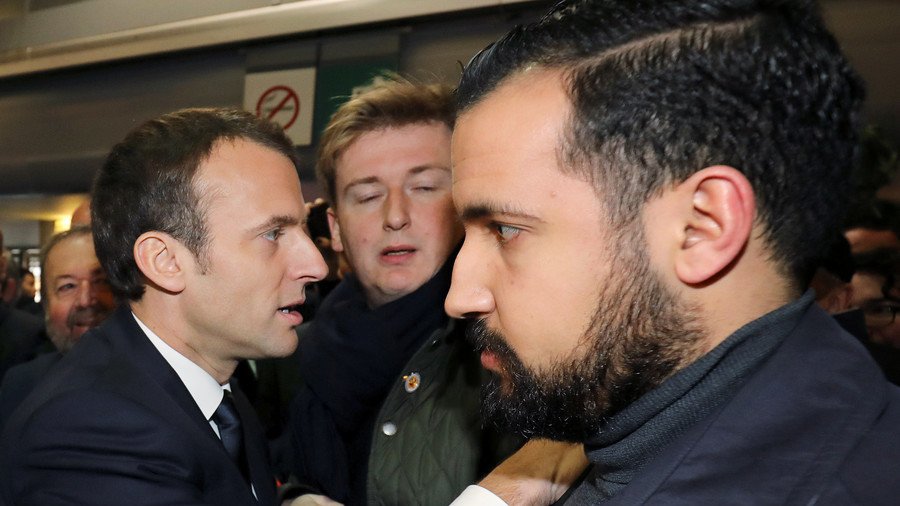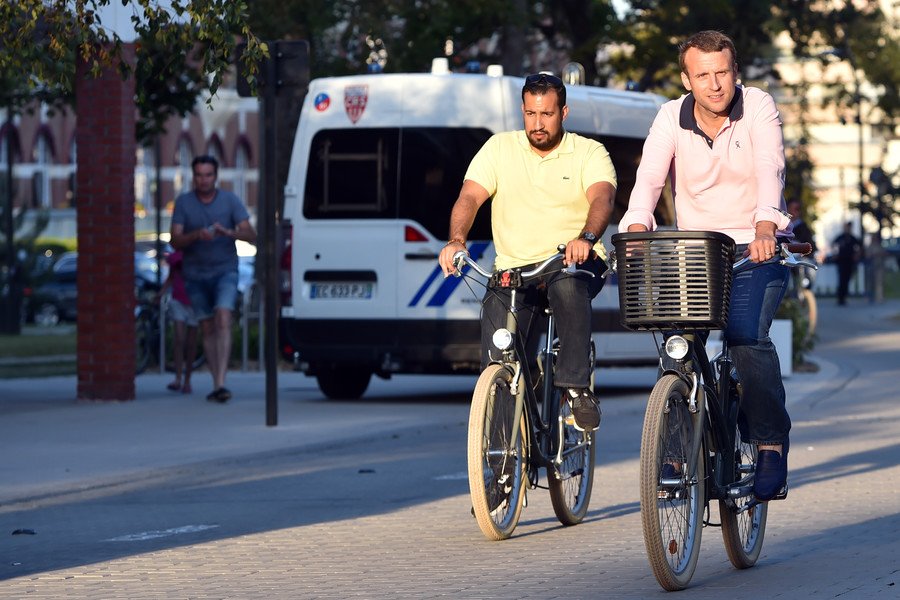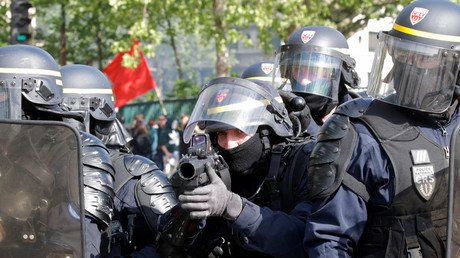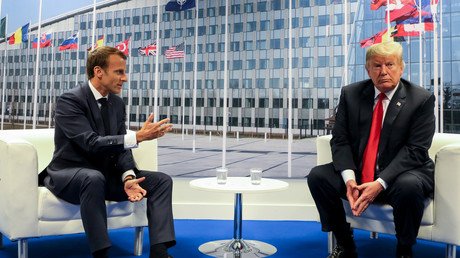Alexandre Benalla: The Rambo at the center of ‘Macron’s Watergate’

Emmanuel Macron's presidency is being battered by its worst scandal so far and at the center of it is the protester-beating bodyguard Alexandre Benalla, a young man with a surprisingly successful career.
On May 1, a man wearing a police helmet was filmed roughing up unarmed protesters at an anti-Macron rally in Paris. In mid-July, he was identified as Macron's bodyguard Benalla. This has given rise to a scandal that could swell up to what the opposition called "Watergate level," with French politicians baffled by the lengths to which Macron's team has gone to protect the bodyguard.
Benalla, 26, has enjoyed a fast-moving career. A rugby player with a degree in law, he started his career guarding politicians in 2010. Aged just 19 or 20, Benalla enrolled in the operational reserve of the Gendarmerie, the French military police, and joined the security team of the Socialist Party. He then switched several high-ranking bosses, including guarding Francois Hollande on his campaign trail in 2012 and, after that, working as a driver for Industrial Renewal Minister Arnaud Montebourg.
According to Montebourg, they separated after just a week, when Benalla caused a car accident in the minister's presence and then tried to flee the scene. Benalla then fell off the radars for a time, reportedly going to Morocco to work for a security company.
Macron’s ‘Rambo’
He was back in France for Emmanuel Macron's election campaign, and that is when he truly started to shine – and was seemingly let loose. A close bodyguard, he was often seen next to Macron during public appearances and several journalists, including from AFP, complained about his "muscular" behavior. A member of the Young Communists of Bobigny and Darcy complained about being dragged away and hit by Benalla during a rally in 2016 – the same moves the burly bodyguard was seen applying to a protester in the May Day 2018 video.
According to leaked internal emails cited by French media, Benalla wanted campaign security staff to be kitted out like riot police, with shields and crowd-control weapons, but the proposal was shot down by the party treasurer Cedric O, who reportedly thought the idea was "crazy" and doubted its legality. Benalla also wanted a permit to carry a gun, but the Interior Ministry denied his request. He still managed to get it later, through Paris police. His eagerness to get his hands on a gun earned him the comparison to Rambo, a flashy nickname now picked up by the press.

Benalla, who hasn't been on active gendarme duty since 2015, holds the rank of lieutenant colonel of the gendarmerie – an exceptional achievement for someone so young, which the force vaguely explains citing his "level of expertise."
When Macron became president, he picked Benalla as his assistant chief of staff and put him in charge of his security. The bodyguard eventually settled in a lavish residence, which, according to reports was paid for by the Elysee.
It is in this position that Benalla decided to don a riot helmet and join the action on May Day.
‘Watergate level’ cover-up?
What Benalla did on May 1 was potentially illegal on several counts: Not only did he beat up unarmed and apparently non-violent protesters, he also did it while wearing police gear – thus impersonating a police officer – and without having been authorized to take part in the action. Another potential charge against him is trying to obtain security footage of the incident.
Voilà ce qu'il se passe quand on manifeste en 2018. J'ai été gazé pour empêcher de filmer la suite #1erMai#QuartierLatin#ViolencesPolicièrespic.twitter.com/PvtJhX5Ay9
— Nicolas Lescaut (@NicolasLescaut) May 1, 2018
Yet, instead of reporting it all to the public prosecutor, as per the French law, Macron's office merely suspended Benalla without pay for 15 days. Only after the events of May 1 came to public attention and an investigation was launched, Macron finally announced he was firing Benalla.
Macron's office has so far kept mum on the incident. Grilled by lawmakers, Interior Minister Gerard Collomb distanced himself from the case, saying he had indeed learned about the May 1 incident on the next day, but felt it was not up to him to initiate any proceedings. So, he passed the information on to Macron's staff and left it at that.
The developing scandal has already grown into the largest in Macron's presidency, raising questions as to just how far above the law the president's inner circle may deem itself. A parliamentary inquiry was set up to establish whether there was a cover-up on Macron's part and opposition leaders have seized on the rich opportunity.
Speaking to BFM TV, Jean-Luc Melenchon, the founder of La France Insoumise political party and one of Macron's opponents in the 2017 election, said Macron is facing something "the level of Watergate" – the 1970s political scandal involving the US President Richard Nixon's administration, which focused on abuses of power and eventually lead to Nixon's resignation.
Bombes atomiques jetées par le préfet de police sur l'Élysée. Ça sent le Watergate.#CommissionEnquete#AffaireBenallaMacron#Collomb#MichelDelpuech
— Jean-Luc Mélenchon (@JLMelenchon) July 23, 2018
It remains to be seen if Macron's apparent attachment to his security chief will cost him anything, including his presidency, but the French president's ratings are likely to take a beating, some 14 months since his decisive election victory.
Subscribe to RT newsletter to get stories the mainstream media won’t tell you.















